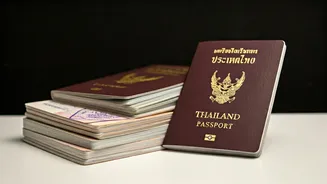Navigating Visa Essentials
Thailand's visa policies are central to any travel planning, and it's essential to understand the different entry options available. Many nationalities
can enter Thailand visa-free, depending on their passport. This is a convenient option for shorter stays, allowing you to explore the country without pre-arranged visas. For longer trips or specific purposes like education, tourist visas are required and it's recommended to obtain these before traveling. A "Visa on Arrival" (VoA) is available for certain nationalities upon entry, simplifying the process for some visitors. Remember to check the specific requirements based on your nationality to ensure smooth entry. Always be aware of the rules; overstaying your visa can lead to problems, so adhere to the allowed duration to avoid any issues. Tourist visas can often be extended while in Thailand, offering flexibility for those who wish to spend more time exploring the country. This can be a lifesaver for travelers with a flexible itinerary. The "visa run" is also possible, a common practice for those who want to stay longer, however, this should be planned carefully.
Visa-Free vs. Visa
Several factors determine if you need a visa for Thailand. Visa-free entry to Thailand is available to citizens of various countries, allowing stays without the need for a pre-arranged visa. The duration of visa-free stays varies depending on your citizenship, so it's important to check the specific allowance for your passport. If you plan to stay longer than the visa-free period permits, you'll need to obtain a tourist visa beforehand. Tourist visas offer a more extended stay compared to visa-free entry, providing greater flexibility for your travel plans. Education visas are available for students planning to study in Thailand, allowing them to remain legally in the country for the duration of their studies. Those aiming for an extended stay might consider a long-term resident visa (LTR), providing a more permanent path for residency. Staying informed about current visa policies is essential, as these can change. Always verify the most up-to-date information from the Thai embassy or consulate in your home country before you travel to ensure a hassle-free entry.
Best Times to Visit
Timing your trip to Thailand can significantly impact your experience. The best time to visit Thailand is during the dry season, which generally falls between November and February. During these months, you can expect sunny skies, lower humidity, and more pleasant temperatures. This is ideal for exploring various destinations and partaking in outdoor activities. The shoulder seasons, March to May and September to October, can also be considered. While temperatures may be hotter and humidity higher, there are fewer crowds. This can be advantageous if you're seeking a more tranquil travel experience. During the rainy season, from June to October, some areas may experience heavy rainfall, which could affect your plans. While the rain might be a concern, this can still be a good time to visit if you don't mind occasional showers, as you'll often encounter fewer tourists. Always check the weather forecast for the specific regions you plan to visit. This will help you plan your itinerary and pack accordingly for the climate. Remember that Thailand's weather can vary throughout the country, so do your research based on your planned destinations.
Extending Your Stay
If you find yourself captivated by Thailand and desire a longer stay, several options are available. Tourist visas can be extended while you are already in Thailand. This is particularly convenient if you decide to extend your trip without pre-planning. Make sure you apply for the extension before your current visa expires to prevent any legal complications. Visa runs are another option for extending your stay, though it’s crucial to understand the limitations and potential complexities. This involves leaving Thailand and re-entering, but the rules regarding frequency and permitted durations should be carefully researched. If you're interested in studying in Thailand, an education visa allows you to extend your stay for the duration of your educational program. Ensure you meet all of the requirements for the particular visa type, as documentation and eligibility criteria can vary. Overstaying your visa is a serious offense with potential consequences, which can include fines, detention, and a ban from re-entering Thailand. Always stay within the terms of your visa to ensure a safe and enjoyable experience.
Important Travel Tips
Before your trip, familiarize yourself with Thailand’s culture, customs, and laws. This knowledge will assist you in respecting local traditions. It will help you avoid misunderstandings during your travels. When packing, bring appropriate attire, especially if you plan to visit temples or religious sites. Modest clothing is usually required out of respect. Research and understand the local currency, Thai Baht (THB), and exchange rates. This will assist you in budgeting and financial transactions. Learn basic Thai phrases to communicate effectively with locals. It is a good way to improve your travel experience and gain a better appreciation of Thai culture. When in public, be aware of your surroundings, and take precautions against petty theft. Take care of your belongings, and keep your valuables secure. Always prioritize your safety and well-being. Be careful with food and water. Drink bottled water to prevent any health problems. Stay updated on any travel advisories or health recommendations issued by your country's government. This can assist you in adapting your travel plans accordingly. Lastly, enjoy your time exploring Thailand, embrace its charm, and create memorable experiences.





















